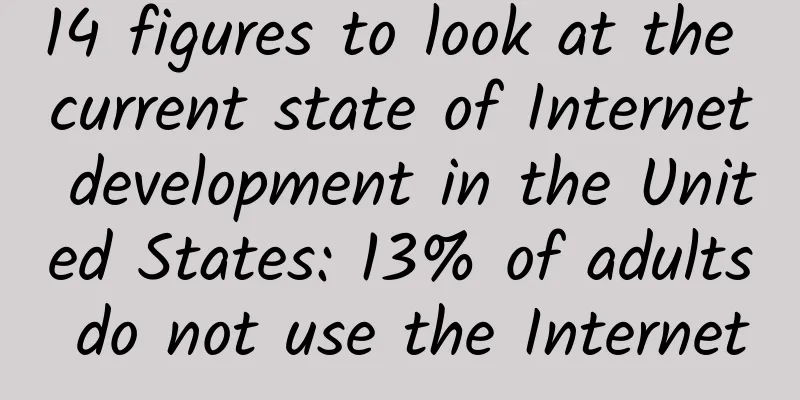14 figures to look at the current state of Internet development in the United States: 13% of adults do not use the Internet

|
Industry insiders are concerned that these people who "live without the Internet" are becoming disconnected from the economy and society, creating an unprecedented "digital divide." Even a technological power like the United States cannot completely escape the impact of this problem. The following 14 sets of figures will give you a glimpse of the truth. 13% of adults do not use the internet According to a report released by the Pew Research Center in January 2014, 13% of American adults do not use the Internet. Pew's research over the years has shown that this number has fluctuated. Between May and September 2013, the percentage of American adults who did not use the Internet increased from 15% to 20%; in 2000, this figure was as high as 52%. 9.5 million people still use dial-up According to data released by Pew in 2013, as of May 2013, 9.5 million people in the United States still used dial-up to access the Internet. Generally speaking, dial-up Internet access is basically unable to support streaming media playback and video conversations. 20% of black people do not use the internet According to data released by Pew in 2014, 20% of black Americans do not use the Internet. Hispanics ranked second, with about 17% of respondents saying they do not use the Internet, and whites ranked third, accounting for 13%. 10% of adults use the Internet outside of their home According to a 2013 Pew report, 10% of American adults use the Internet outside of their own homes, suggesting that this group uses public computers or borrows a friend's computer to access the Internet. 33% of adults value public computing devices A Pew report released in 2013 showed that 33% of American adults said that computers and printers in public libraries are "extremely important" to them and their families. Several past reports have also found that public libraries are an important way for people in low-income communities to access the Internet. 25% of American adults with annual incomes below $30,000 do not use the Internet. No one is unaware of the importance of the Internet A 2010 study by the Social Science Research Council found that low-income American families consider the Internet very important. This means that no one needs to be convinced of the importance of the Internet, not even immigrants or homeless people. 133.3 million adults do not own a smartphone According to a Pew report released in January 2014, 133.3 million adults in the United States do not own a smartphone, while about 10% of Americans do not own a mobile phone (feature or smartphone). Online shopping saves an average of $8,674 per year A 2013 report by the Internet Innovation Alliance showed that Internet users can save an average of $8,674 per year by purchasing clothes and food online and comparing prices for household items. Broadband service costs $51 per month According to the nonprofit New America Foundation, the average monthly broadband service cost in the U.S. was $51 in 2014. 18% of teachers talked about students completing homework Data released by Pew in 2013 showed that 18% of teachers across the United States said that "all or nearly all" students have digital media to help them complete their homework. |
<<: AdMaster: Research on online shopping behavior of post-90s
Recommend
The efficacy and function of Akebia
As the pressure of modern life increases, more an...
It is in summer, but its soul lives forever
It is recorded in "Shennong's Herbal Cla...
Vitamin B17
Everyone must be familiar with vitamins. We all t...
Is it healthier not to order takeout? Wrong! If you have these 7 bad cooking habits, it will hurt your body more than eating takeout
When it comes to ordering takeout Many people fee...
The efficacy and function of Melaleuca alternifolia leaves
What are the functions of Melaleuca leaves? As a ...
What differentiates people from the north and south? Dumplings or tofu pudding? Neither! Actually, it’s this!
In middle school geography class, we all learned ...
A merchant was fined for selling smashed cucumbers. What should we pay attention to when eating cold dishes in summer?
According to news reports, a certain merchant was...
Are modern people obsessed with pets? Little do people know that ancient people were also crazy about pets~
According to the data from the "White Paper ...
The effects and functions of bitter bark
Friends who don’t know bitter bark will not under...
When an asthma attack occurs, why do people in movies and TV shows always use paper bags to breathe? Can this save lives?
If I tell you that this can really save lives, yo...
Wuwei Disinfection Drink
Wuwei Xiaodu Drink is a kind of traditional Chine...
The sweetness is too high! It turns out that a "straight man" confession can be sweet beyond measure~~
Who says romance is only about sweet words and co...
The efficacy and function of Ma Yaqi
Ma Yaqi is a medicinal material that can treat ma...
Want to raise this kind of "golden retriever"? Warning: life imprisonment!
Golden Retriever, my dream dog, tall and gentle. ...
Will deer antler tablets expire?
Deer antler slices are actually deer antler in es...









